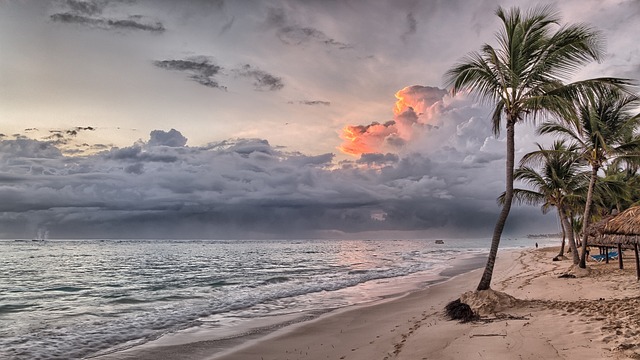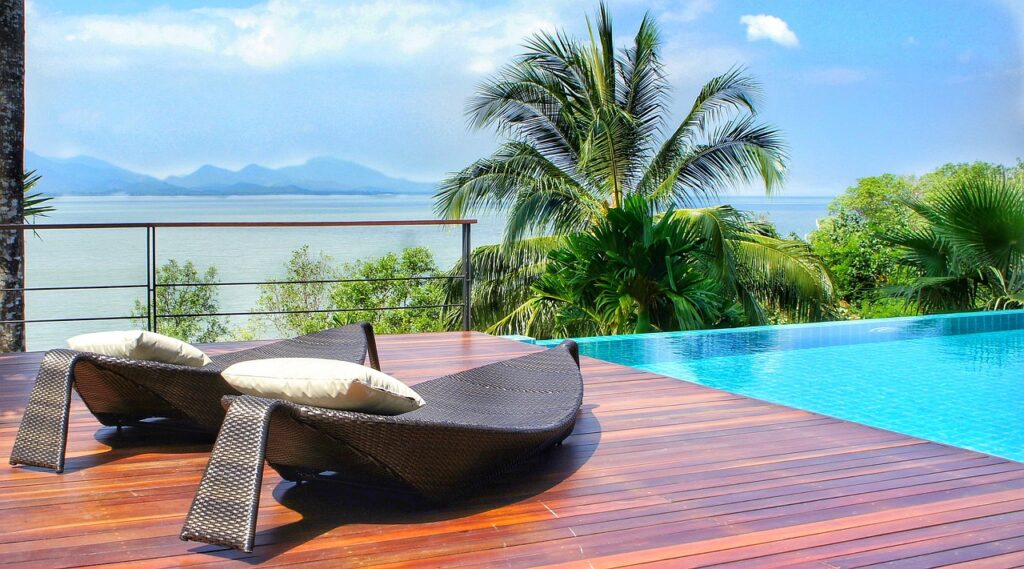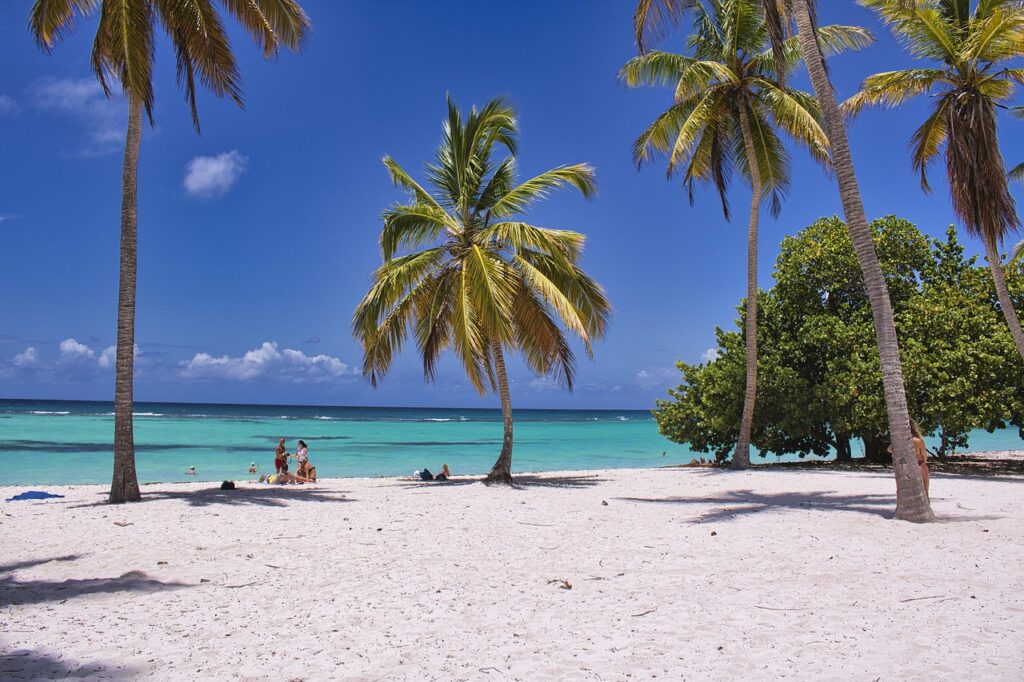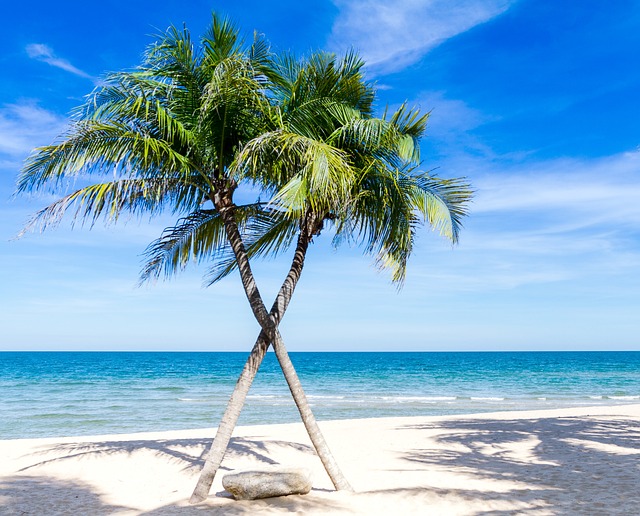The island of Koh Samui, known for its stunning beaches, vibrant culture, and tropical climate, has long been a favorite among tourists and investors. As one of Thailand’s most sought-after destinations, the impact of tourism on Koh Samui’s real estate market has been profound. The constant influx of visitors has driven up demand for rental properties and luxurious beachfront villas, creating a dynamic shift in property prices across the island. As tourism continues to expand, so too does the appeal of real estate investment in this paradise.
For investors, the growing interest in Koh Samui offers exciting opportunities—but it also comes with unique challenges. Understanding how tourism influences demand for properties and affects pricing trends is essential for making informed decisions. Whether you’re considering a new investment or curious about the market, exploring the connection between tourism and real estate on Koh Samui will help you navigate this flourishing yet competitive property landscape.
The Role of Tourism in Driving Real Estate Demand
The rapid rise of tourism in Koh Samui has had a significant influence on the island’s real estate market. Each year, more and more visitors are drawn to Koh Samui for its natural beauty, tranquil beaches, and luxurious resorts, resulting in a growing demand for rental properties and vacation homes. This demand is especially high for beachfront villas, luxury condominiums, and properties that offer breathtaking views of the ocean or lush tropical landscapes—features that appeal to both short-term tourists and expatriates seeking a longer stay or permanent relocation.
Tourists often fall in love with Koh Samui’s lifestyle, leading many to consider staying on the island for extended periods. Whether for a few months or a lifetime, this influx of visitors fuels the need for rental properties, from short-term holiday rentals to long-term expat housing. As a result, the real estate market on the island is experiencing higher demand, with more investors seeking to capitalize on the tourism boom by purchasing properties designed to cater to the growing number of visitors.
The tourism sector has not only boosted occupancy rates for rental properties but has also positioned Koh Samui as a prime destination for real estate investment. Investors looking for passive income through short-term vacation rentals or those interested in securing long-term tenants have been drawn to the island’s unique opportunities. The continuous flow of tourists, especially during high seasons, guarantees a steady stream of potential renters, making Koh Samui an attractive location for investment.

Impact of Tourism on Property Prices
As tourism continues to drive up the demand for real estate on Koh Samui, it has had a direct effect on property prices. With more people looking to purchase or rent, competition for prime locations has intensified, particularly in beachfront areas and other popular spots near key attractions. As a result, property values have appreciated significantly, creating a market where prices are strongly influenced by proximity to luxury amenities and the island’s most desirable locations.
High Demand for Beachfront and Luxury Properties
The sharpest price increases have been seen in areas that cater to high-end tourism, especially along Koh Samui’s famous beaches. Properties such as beachfront villas, luxury resorts, and residences with panoramic ocean views are in constant demand from tourists seeking luxurious accommodation and investors looking to capitalize on the island’s allure. These locations often command premium prices due to their proximity to the beach and the appeal they hold for affluent travelers and expatriates.
This rising demand for luxury properties has led to a sharp increase in property values, making real estate investment in these areas a high-cost but potentially highly rewarding opportunity. Investors who purchase beachfront or luxury properties can expect to generate substantial rental income, particularly during the peak tourist season when demand for premium accommodations is at its highest.
Increasing Prices in Inland and Developing Areas
While beachfront properties have seen the most significant price appreciation, the demand for real estate is spreading beyond the coast. Inland areas, especially those close to natural attractions like waterfalls or popular hiking trails, are also experiencing a rise in property values. As the island’s tourism infrastructure continues to expand to accommodate growing visitor numbers, even less-centralized locations are benefiting from this growth, making them increasingly attractive to investors.
For those seeking more affordable investment options, properties located slightly away from the beachfront or in developing areas of Koh Samui may offer an appealing entry point. While these properties may come at a lower initial cost compared to prime beachfront locations, they are still benefitting from the broader rise in real estate demand driven by tourism. As Koh Samui continues to develop, these inland and emerging areas are seeing gradual price appreciation, making them valuable for long-term investment. Investors with an eye on future growth may find these locations particularly appealing as the island’s infrastructure and tourism footprint expand further.
As tourism plays an increasingly central role in shaping Koh Samui’s real estate market, the demand for properties across the island continues to rise, driving up prices in both luxury coastal areas and more remote inland regions. Understanding these trends and identifying key opportunities will be essential for investors looking to maximize their returns in this dynamic and evolving market.

Real Estate Investment Opportunities in a Tourism-Driven Market
The growing tourism industry in Koh Samui has significantly shaped the island’s real estate market, offering attractive investment opportunities for those looking to take advantage of the island’s rising popularity. However, investing in a tourism-driven market comes with its own set of challenges, particularly due to the seasonal nature of tourism and the fluctuations in demand that come with it. Understanding these dynamics is crucial for making smart investment decisions in Koh Samui.
Short-Term Rental Opportunities
One of the most lucrative aspects of real estate investment in Koh Samui is the potential for earning income through short-term vacation rentals. With an influx of tourists flocking to the island during peak seasons, properties in high-demand areas such as beachfront villas and luxury condominiums are highly sought after. These properties are often rented out to international travelers looking for unique, luxury experiences by the beach, offering a significant source of rental income.
Platforms like Airbnb and other vacation rental services make it easy for property owners to market their rentals to a global audience. The steady stream of tourists ensures that properties in desirable locations rarely remain vacant, particularly during high travel seasons. This means investors can enjoy consistent rental returns throughout the year, even if tourism tends to fluctuate seasonally. The potential for short-term rental income, combined with the appeal of luxury properties, makes Koh Samui an attractive option for those seeking to generate passive income in a booming tourism market.
Long-Term Rental Market for Expats
In addition to short-term vacationers, Koh Samui is also drawing in a growing number of expatriates and digital nomads who are looking for long-term rental solutions. These individuals are often drawn to the island’s laid-back lifestyle, tropical environment, and relatively affordable cost of living. For investors, this has opened up a new opportunity to cater to the long-term rental market.
Expatriates, especially families and professionals, tend to look for fully furnished and comfortable homes that offer a sense of stability and convenience. Many are searching for properties located near essential amenities such as international schools, healthcare facilities, and shopping centers. This has created a robust demand for well-maintained properties that can serve long-term tenants.
For investors, catering to this demographic offers several advantages. Long-term rentals provide stable, year-round income, reducing the reliance on the seasonal fluctuations that affect short-term rentals. Additionally, with less frequent tenant turnover, managing these properties is often simpler and more cost-effective. For those looking to invest in Koh Samui’s real estate market, focusing on the growing demand for expat housing offers an opportunity to secure steady returns while tapping into a thriving community of long-term residents.
Challenges of a Tourism-Driven Real Estate Market
While the real estate market in Koh Samui offers exciting opportunities, especially for those looking to capitalize on tourism, it’s essential to recognize the unique challenges that come with investing in a tourism-driven market. Property prices and rental demand can be influenced by a variety of factors, many of which are closely tied to broader tourism trends and global travel patterns.
One of the primary challenges is the seasonality of tourism. While Koh Samui enjoys a steady stream of visitors throughout the year, there are distinct peak and low seasons that affect both rental demand and property prices. During peak seasons, such as the holiday months or during major events, rental properties can generate significant income. However, in off-peak months, property owners may see a drop in demand, particularly for short-term rentals. Investors need to be prepared for these fluctuations and may need to adjust their rental strategies to ensure consistent occupancy throughout the year.
Navigating Property Regulations and Foreign Ownership
Another key challenge for investors, particularly those from overseas, is navigating the complex regulations surrounding foreign ownership and property investment in Thailand. While foreigners can legally own condominiums, purchasing land or standalone properties can be more complicated. Thai laws restrict foreign ownership of land, meaning that investors need to explore alternative options such as long-term leases or partnerships with Thai nationals.
These legal restrictions require careful consideration and planning. Investors should seek local legal advice to fully understand the regulations and ensure that their property investments are compliant with Thai law. Working with experienced legal professionals can help avoid potential pitfalls and ensure that investors are following the correct procedures for property ownership.
Understanding Market Trends and Economic Factors
Given that Koh Samui’s real estate market is closely tied to tourism, it’s essential for investors to stay informed about global economic and travel trends that could impact the market. External factors such as changes in flight availability, visa policies, or economic downturns in key tourism markets can have a direct effect on property prices and rental demand.
Additionally, the rise in sustainable tourism and increasing interest in eco-friendly accommodations could shape future real estate trends. Investors who are able to adapt to these shifts and cater to emerging market demands will likely have a competitive edge in the evolving landscape of Koh Samui’s real estate market.

Heveatecture’s Role in Shaping Koh Samui’s Real Estate Landscape
As tourism continues to drive demand for properties on Koh Samui, innovative architectural firms like Heveatecture are playing a key role in shaping the island’s real estate landscape. By combining modern design principles with a deep respect for the island’s natural beauty, Heveatecture creates spaces that not only cater to the growing tourism market but also enhance the island’s appeal for expatriates and long-term residents.
Designing for Luxury and Sustainability
In response to the high demand for luxury beachfront villas and eco-friendly properties, Heveatecture focuses on creating designs that blend seamlessly with Koh Samui’s tropical environment. Their approach emphasizes sustainability, ensuring that properties are both luxurious and environmentally responsible. Whether it’s a beachfront villa with panoramic ocean views or a luxury condominium, Heveatecture’s projects meet the needs of tourists seeking unique, high-end accommodations, as well as expats looking for long-term, thoughtfully designed homes.
By prioritizing aesthetics and functionality, Heveatecture helps investors create properties that stand out in a competitive real estate market, enhancing both property value and the overall investment potential.
Conclusion
The impact of tourism on Koh Samui’s real estate market has created a dynamic and appealing landscape for investors. With the island’s rising popularity as a prime destination for both tourists and expatriates, the demand for rental properties and luxury accommodations has surged, driving property prices upward and opening doors for those seeking real estate investment opportunities.
Whether you’re targeting short-term vacation rentals or catering to the growing expat community with long-term rentals, there are significant opportunities to generate consistent income. However, investors must also be mindful of the challenges that come with a tourism-driven market, such as seasonal fluctuations and the complexities of foreign ownership laws in Thailand.
By understanding these market dynamics and staying informed about tourism trends and regulatory requirements, investors can make well-informed decisions that allow them to capitalize on Koh Samui’s flourishing real estate market, while navigating its unique challenges successfully.

Tourism significantly drives demand for real estate in Koh Samui, particularly in prime locations like beachfronts and areas near popular tourist attractions. As more tourists visit and seek temporary or permanent accommodations, the competition for properties increases, leading to higher property prices. This is especially true in high-demand areas such as luxury villas and condominiums that cater to affluent visitors and expatriates. As a result, real estate investment in these locations often sees steady appreciation over time.
Beachfront properties are among the most desirable real estate on Koh Samui, thanks to their prime location and appeal to both tourists and expatriates. The high demand for properties offering direct access to the island’s stunning beaches drives up competition, leading to increased property prices. These locations are especially popular for short-term vacation rentals and luxury stays, making them a valuable investment for those looking to capitalize on tourism. The scarcity of available beachfront land further contributes to the premium pricing.
Yes, investing in inland properties can be a smart choice, particularly as tourism continues to grow. Inland areas, especially those close to popular natural attractions like waterfalls and hiking trails, are seeing steady price appreciation. As Koh Samui’s infrastructure expands to accommodate more tourists, even less-centralized locations are becoming more valuable. These inland properties often offer a more affordable entry point for investors compared to beachfront properties, while still benefiting from the island’s rising demand for real estate.
Absolutely. The steady influx of tourists to Koh Samui ensures high occupancy rates for short-term vacation rentals, especially during peak travel seasons. Properties in desirable locations, such as beachfront villas and luxury condos, are often booked well in advance, providing investors with a consistent stream of rental income. Platforms like Airbnb make it easier to market these properties to an international audience, increasing the profitability of short-term rentals. The demand for high-quality accommodations ensures that well-maintained properties rarely stay vacant for long.
Yes, there is strong demand for long-term rentals on Koh Samui, particularly among expatriates and digital nomads. Many individuals seeking a slower, tropical lifestyle are drawn to the island for extended stays, creating a stable market for long-term rentals. These tenants are typically looking for comfortable, fully furnished homes that offer a sense of permanence. This demand provides investors with the opportunity to secure year-round tenants, reducing the reliance on seasonal tourism and ensuring a steady stream of rental income.
The properties in the highest demand due to tourism include luxury beachfront villas, condominiums, and those offering ocean views. These high-end properties are particularly attractive to tourists seeking premium vacation accommodations and expatriates looking for a luxurious, tropical lifestyle. Investors targeting these types of properties can often command higher rental prices, especially during the peak tourist seasons when demand for luxury accommodations is at its highest.
While the tourism-driven real estate market in Koh Samui offers many opportunities, it is not without risks. One of the primary risks is the fluctuation in tourism demand, which can affect both property prices and rental income. Economic downturns, travel restrictions, or global events such as pandemics can lead to a drop in tourism, impacting the profitability of short-term rentals. Investors must stay informed about global tourism trends and be prepared for seasonal variations in demand.
Managing a short-term rental in Koh Samui is made easier with platforms like Airbnb, which allow investors to reach international travelers. Many investors also choose to hire a local property management company to handle day-to-day operations, such as guest check-ins, cleaning, and maintenance. This ensures that the property remains well-maintained and that guests have a positive experience, leading to higher occupancy rates and better reviews. Working with a management company can also help navigate local regulations and streamline the rental process.
Foreign ownership laws in Thailand can be complex, so it’s essential to seek local legal advice when investing in Koh Samui real estate. While foreigners are permitted to own condominiums, purchasing land or standalone properties is restricted. Investors may need to explore alternative options such as long-term leases or partnerships with Thai nationals to comply with ownership laws. It’s crucial to understand these regulations fully before making a purchase to ensure that your investment is legally sound and secure.
Yes, Koh Samui is an excellent place for real estate investment, particularly for those looking to tap into the island’s booming tourism sector. The steady rise in property values, coupled with the growing demand for both short-term rentals and long-term accommodations, presents strong opportunities for investors. Whether targeting the luxury beachfront villa market or the increasingly popular expat housing market, Koh Samui offers diverse investment options with the potential for significant returns.
